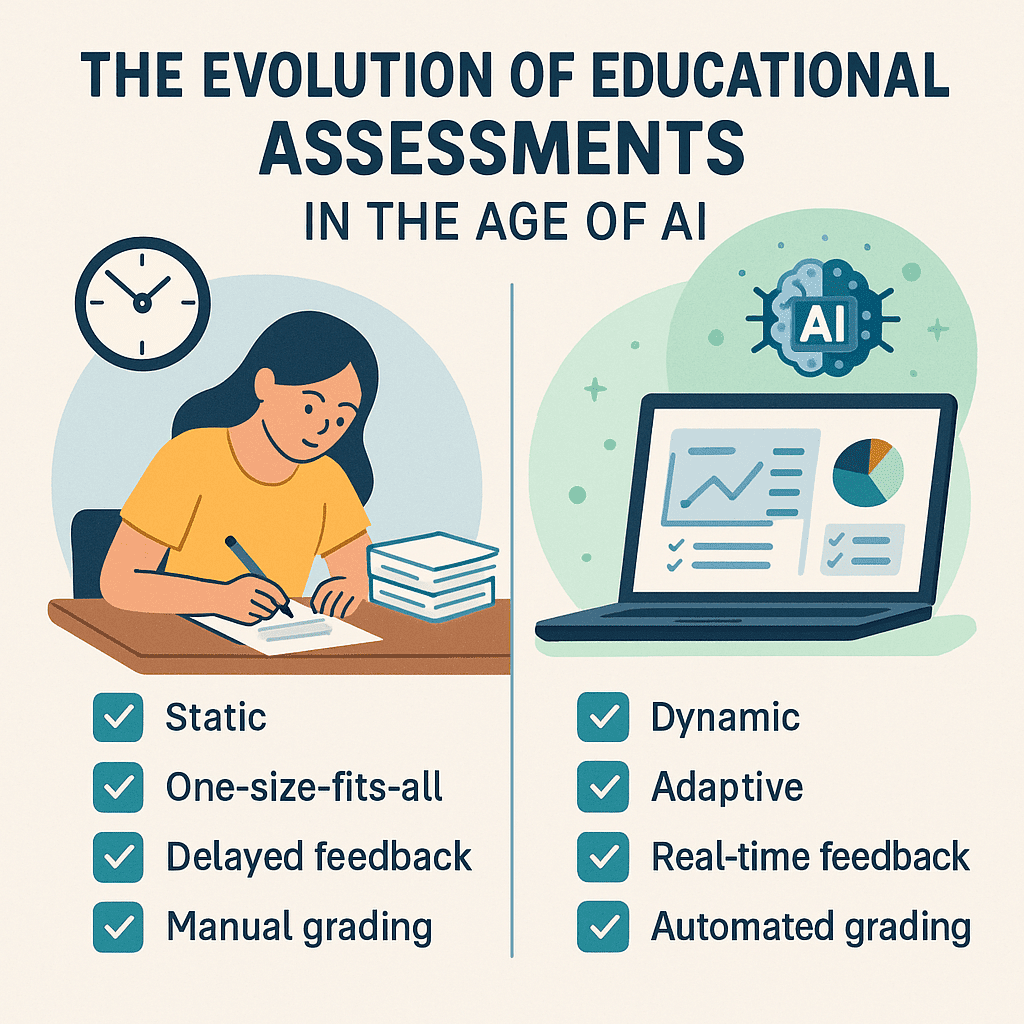Educational assessments in the age of AI are undergoing a profound transformation. From the days of standardized paper-based testing to the rise of adaptive, AI-driven evaluations, the very nature of how we measure learning is evolving to meet the demands of a digital-first, learner-centered era.
As technologies like machine learning and natural language processing take root in classrooms and universities, educators are reimagining the role of assessment—from simply grading to guiding, adapting, and empowering student learning.
From Static Tests to Dynamic Evaluation
Traditionally, educational assessment was characterized by:
- Fixed test schedules
- Standardized formats (MCQs, essays, short answers)
- Post-hoc feedback (days or weeks later)
- One-size-fits-all measurement
In contrast, AI-powered assessment systems deliver:
- Real-time evaluations
- Personalized difficulty levels
- Continuous feedback
- Competency-based progression
This marks a paradigm shift from assessment as a judgment to assessment as a learning tool.
What’s Driving This Evolution?
1. Real-Time Feedback Through AI
Modern AI systems provide instant feedback on assignments, quizzes, and open-ended responses. Students no longer wait days to learn what they did wrong AI tells them in seconds.
This trend is particularly useful in formative assessments where ongoing improvement matters more than final grades.
2. Adaptive and Personalized Assessments
Using predictive algorithms, AI tools adapt the difficulty of questions based on a learner’s prior performance ensuring each student is challenged appropriately.
Adaptive platforms are especially effective in competency-based education models, where learners must master a skill before moving forward.
3. Performance Analytics and Insight
AI collects and analyzes performance data to:
- Identify learning gaps
- Suggest intervention strategies
- Predict success or risk levels
- Enable personalized feedback reports
Educators using such tools are better equipped to tailor instruction to individual or group needs.
You can explore educator-oriented courses on these strategies at The Case HQ Courses Page.
Real-World Example: AI in Essay Assessment
Consider an AI tool that evaluates essays using Natural Language Processing (NLP). Instead of a teacher reading every submission, the system:
- Scores grammar, coherence, and logic
- Flags off-topic or low-quality sections
- Suggests improvements aligned to a rubric
- Auto-generates formative feedback for revision
This system supports large-scale learning environments (MOOCs, distance learning), enabling high-quality feedback at speed and scale.
Benefits of AI in Modern Assessments
- Efficiency: AI handles repetitive grading tasks, freeing up educators to mentor and coach.
- Scalability: Systems evaluate thousands of learners simultaneously.
- Equity: Reduces bias in grading, especially with standardized rubrics.
- Transparency: Dashboards display learner progress and outcomes clearly.
Institutions adopting AI benefit from data-rich decision-making and better alignment with digital learning outcomes.
Challenges and Ethical Considerations
Despite its advantages, AI in assessment must be used with caution:
- Bias in Algorithms: If training data is biased, results may disadvantage certain learner groups.
- Lack of Human Empathy: AI lacks the ability to interpret emotion, context, or creativity as deeply as humans.
- Transparency and Oversight: Learners and educators need to understand how AI makes decisions.
- Privacy and Security: Sensitive academic data must be protected.
That’s why professional development in responsible AI integration as offered by The Case HQ is essential for today’s educators.
What Does the Future Hold?
The future of educational assessments in the age of AI is likely to emphasize:
- Competency mapping over rote memorization
- Portfolio-based assessments enriched by AI feedback
- Lifelong learning records stored and updated through secure AI systems
- Human-AI collaboration where teachers make final judgments, supported by automated insights
Educators must be equipped not just to use AI, but to evaluate it critically, ensuring that it serves pedagogical goals, not just efficiency.



Responses